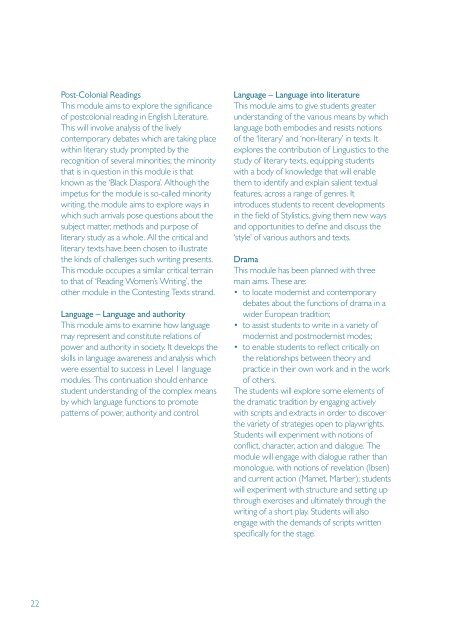ba-hons-english-creative-writing
ba-hons-english-creative-writing
ba-hons-english-creative-writing
You also want an ePaper? Increase the reach of your titles
YUMPU automatically turns print PDFs into web optimized ePapers that Google loves.
Post-Colonial Readings<br />
This module aims to explore the significance<br />
of postcolonial reading in English Literature.<br />
This will involve analysis of the lively<br />
contemporary de<strong>ba</strong>tes which are taking place<br />
within literary study prompted by the<br />
recognition of several minorities; the minority<br />
that is in question in this module is that<br />
known as the ‘Black Diaspora’. Although the<br />
impetus for the module is so-called minority<br />
<strong>writing</strong>, the module aims to explore ways in<br />
which such arrivals pose questions about the<br />
subject matter, methods and purpose of<br />
literary study as a whole. All the critical and<br />
literary texts have been chosen to illustrate<br />
the kinds of challenges such <strong>writing</strong> presents.<br />
This module occupies a similar critical terrain<br />
to that of ‘Reading Women’s Writing’, the<br />
other module in the Contesting Texts strand.<br />
Language – Language and authority<br />
This module aims to examine how language<br />
may represent and constitute relations of<br />
power and authority in society. It develops the<br />
skills in language awareness and analysis which<br />
were essential to success in Level 1 language<br />
modules. This continuation should enhance<br />
student understanding of the complex means<br />
by which language functions to promote<br />
patterns of power, authority and control.<br />
Language – Language into literature<br />
This module aims to give students greater<br />
understanding of the various means by which<br />
language both embodies and resists notions<br />
of the ‘literary’ and ‘non-literary’ in texts. It<br />
explores the contribution of Linguistics to the<br />
study of literary texts, equipping students<br />
with a body of knowledge that will enable<br />
them to identify and explain salient textual<br />
features, across a range of genres. It<br />
introduces students to recent developments<br />
in the field of Stylistics, giving them new ways<br />
and opportunities to define and discuss the<br />
‘style’ of various authors and texts.<br />
Drama<br />
This module has been planned with three<br />
main aims. These are:<br />
• to locate modernist and contemporary<br />
de<strong>ba</strong>tes about the functions of drama in a<br />
wider European tradition;<br />
• to assist students to write in a variety of<br />
modernist and postmodernist modes;<br />
• to enable students to reflect critically on<br />
the relationships between theory and<br />
practice in their own work and in the work<br />
of others.<br />
The students will explore some elements of<br />
the dramatic tradition by engaging actively<br />
with scripts and extracts in order to discover<br />
the variety of strategies open to playwrights.<br />
Students will experiment with notions of<br />
conflict, character, action and dialogue. The<br />
module will engage with dialogue rather than<br />
monologue, with notions of revelation (Ibsen)<br />
and current action (Mamet, Marber); students<br />
will experiment with structure and setting up<br />
through exercises and ultimately through the<br />
<strong>writing</strong> of a short play. Students will also<br />
engage with the demands of scripts written<br />
specifically for the stage.<br />
22


